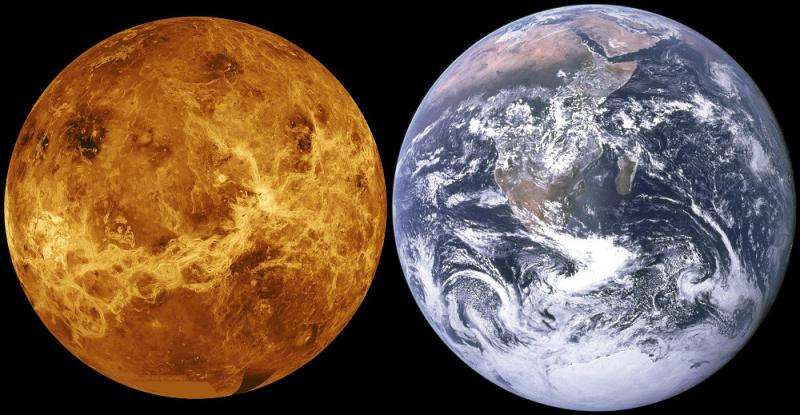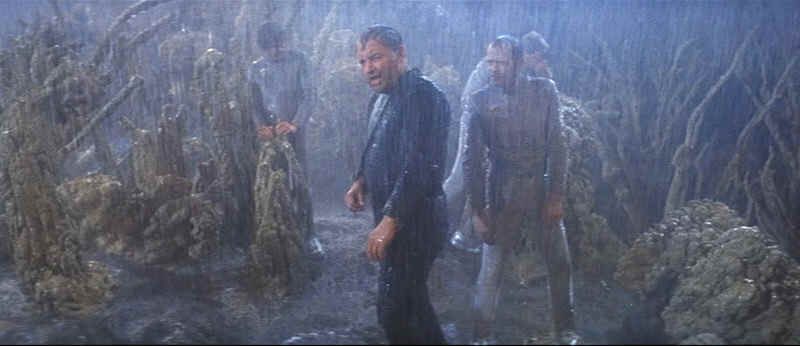
Posted on 01/26/2024 7:31:13 PM PST by Red Badger

Size comparison of Venus and Earth. Credit: NASA/JPL/Magellan Venus is only slightly smaller than the Earth, and so has enjoyed billions of years of a warm heart. But for this planet, sometimes called Earth's sister, that heat has betrayed it. That planet is now wrapped in suffocating layers of a poisonous atmosphere made of carbon dioxide and sulfuric acid. The pressures on the surface reach almost 100 times the air pressure at Earth's sea level. The average temperatures are more than 700°F, more than hot enough to melt lead, while the deepest valleys see records of more than 900°.
If Venus is indeed Earth's sister, she's a twisted one. Like Mars, we suspect that Venus also once hosted a thinner, balmier atmosphere and a surface replete with liquid water oceans. The reasoning here is a little more tenuous than for Mars—where we can literally see the evidence for water before our very eyes—but the thinking is that both Venus and Earth formed in a roughly similar fashion, in roughly the same orbits with roughly the same material. Thus we should have been born with roughly the same amount of water.
Like Earth, most of that water would have been chemically bound up in rock, buried deep in the mantle. But some of it may have leeched to the surface or been delivered by hosts of water-rich comets shortly after formation, building up a supply on the surface, once again stabilized by a thick atmosphere.
What doomed Venus was not any fault of its own, but our own treacherous sun. As stars age they gradually brighten. Day by day it's imperceptible, but over the course of millions of years it completely changes the character of a star. Billions of years ago our sun's habitable zone was shifted inwards compared to where it rests now, but with increased brightness comes increased heat, and that habitable zone steadily creeps outwards over time.
Did Venus ever host life? I doubt we'll ever know, given the excruciating temperatures on the surface that make exploration nearly impossible. But it's likely that it had water and a rich atmosphere—the basic ingredients were there. But if life did gain a foothold it did not last long. As our sun aged, Venus got warmer and warmer. On a warmer planet, more water exists as vapor in the atmosphere than as liquid on the surface.
At first the changes were small, with nothing more than a higher dew point to mark the inexorable path to destruction. But at some point in the past—we are not sure exactly when—Venus reached a tipping point. With too much water vapor, the atmosphere of Venus became too good at trapping the heat radiating from the surface. That radiation could not penetrate the haze and make into space, but instead was ensnared within the atmosphere itself, heating it up.
VIDEO AT LINK...............
What came next was, at least, mercifully quick. Venus entered a feedback loop, dumping more heat into the atmosphere, which boiled the oceans into more vapor, which increased the temperatures, and so on. First the shallow lakes and streams were gone, then came the deeper oceans, until every scrap of water was blowing in the winds of the atmosphere.
With its proximity to the ever-brightening sun, the water vapor did not last long. Solar radiation pummeled it, disassociating its chemical bonds and sending the oxygen and hydrogen flying away, joining a grim procession beyond our solar system.
If Venus had plate tectonics like the Earth, then this is where that process came to end. With no water to act a lubricant, the great slow grinding of the plates seized up, locking the crust in place. This constant churning acts as a natural sink for carbon: the carbon dioxide binds to rocks which get pulled deep into the mantle, preventing too much carbon from building up in the atmosphere.
But without the cleansing effect of plate tectonics, carbon dioxide levels rose to dangerous heights, its own ability to absorb radiation from the surface choking off any remaining hope for rescuing the planet. Eventually the atmosphere would pile upon itself until it reached its present swollen size.
As our sun aged, Venus strangled itself.
Venus is not alone in sharing that fate, for the sun has not yet reached its final days. It continues to brighten, bringing more warmth to the solar system day by day, its habitable zone steadily inching outwards with every passing year.
At some point, approximately 500 million years from now, Venus will not be alone, The Earth's oceans will boil, our continents will halt their ancient motion, and we will finally be twins with our sister: dead, lifeless, and strangling on our own bloated atmosphere.
Provided by Universe Today
Thanks Red Badger.
Selections from the keyword and "venus" search results, sorted:
Oh, God, don’t tell Hannity!
Seriously, if in the very near future we cannot shade the Earth from some of the sunlight, we deserve our fate. Better yet, make the “shades” solar collectors of one form or another to collect and use the energy in factories in space, processing (etc.) materials from asteroids, or magnetically catapulted to said factories from moons and so on.
Of course, if the “collector” is a giant mirror for a furnace, it could potentially be used as a weapon turned Earthward. Hey, Houthis! How would you like 350 deg. F every day at 2-4 pm?
Absolutely right. Sun will become a red giant like all stars do and burn up earth and mars. Jupiter & Saturn may survive a few more billion years.
Radar scans of the surface indicate thousands of volcanic structures, some of which were active 30 years ago when the scans were made.
Four Russian spacecraft landed on Venus and remained operational long enough to get photographs of the scenery. They show smooth basaltic plains strewn with dirt and small rocks. The sky is yellow.
There are some very high mountain ranges on Venus, extending 7 miles above the main surface. The Russian landers were not directed to those areas.
The CO2 atmosphere at the surface has pressures similar to those of deep-sea bottoms on Earth at about 3000 feet. Temperatures run 700 to 900 degrees (Fahrenheit). Probes only last a few minutes under those conditions.
Venus has been used as an ugly poster child to illustrate the threat of "climate change". That seems like a ridiculous projection. Venus has never had a climate even remotely similar to that of earth.
I’d bet that the 7th extinction event will make Earth look like her sister...
Just like the 2nd or 2rd one did...
Bookmark.
It doesn’t take a rocket scientist to know it was too close to the sun.
Planet full of woketards?
>> Venus has been used as an ugly poster child to illustrate the threat of “climate change”.
This article, however, blames the intensifying Sun
Well damn! I thought we had billions of years until the sun exploded, now we learn we only have a half billion years.
“...water leeched to the surface”
Did the leeches carry the water there?
Too much rain.

I found the very mention of "climate change" and the phrase "Why Venus Died" to be annoying references to propaganda articles I have seen elsewhere. I am a bit twitchy on that subject.
Venus did not die because it never lived. And there is no evidence as yet that the climate has ever changed there since the original condensation of the atmosphere, except for the extensive record of volcanic eruptions. It is possible, but we have no observations to make the conjectures described in the article.
Earth has experienced several Ice Ages since mankind existed on the planet, and we are at the tail end of one right now. There is geologic evidence that Earth was a frozen ice ball right down to the equator about one billion years ago. Earth was quite a bit warmer about 250 million years ago than it is now.
Mars was once quite a bit warmer and had shallow seas with an Earth-like atmospheric pressure. Something blew all of that away in the distant past.
Did something happen to Venus? Maybe.
There is an awful lot we do not know. It needs some more poking around.
Recent discoveries reveal MAGA movements destroyed Venus
For starters… Older Wiki pages and likely most astronomy books give the tilts of Jupiter and Venus as 3.13 and 177.3. Most pople would just glance at that and never give it any thought; what you had to realize was that you needed to view tilt as the angle distance from a perpendicular to the plane of the system. Viewed that way, Jupiter and Venus have the exact same tilt to within less than half a degree and newer Wiki pages give the tilt of Venus as 2.64 degrees.
That, of course, brings up the subject of Immanuel Velikovsky, who claimed that Venus amounted to material that had been ejected from Jupiter [as a means of relieving electrical stress]. The thing about axis tilts likely would not shock or surprise him; everybody else is totally snaffed by it. Nobody should believe in extreme coincidences and there is no way to start with either standard theories or David Talbott’s version of a Saturn theory and see Jupiter and Venus having the same tilt as anything other than an extreme coincidence.
Velikovsky also predicted the conditions that would be found on Venus, particularly the extreme surface temperatures and that was in 1950 when science books were telling us that conditions on Venus were almost certainly similar to those on Earth...
>> we have no observations
>> There is an awful lot we do not know
Notwithstanding the other salient points you’ve made.
- - -
Should critical thinking prove to be the unintended side-effect of the mindless propaganda, perhaps we’ll have a chance.
Perhaps Venus had life once. If it did it apparently did not pull carbon dioxide out of the air like life on Earth does. Plants have become so efficient at this task that Earth’s Atmosphere is only .06% CO2.
Y’all just don’t want to admit it.’Earth is pretty unique, bcause it as made that way.
Magnetosphere to protect earth from the ravages of solar winds.
Lots of surface water.
Temperature ranges that doesn’t destroy proteins, DNA and other organic compounds.
Y’all keep thinking this was all just a random occurrence at your peril.
In my opinion it was designed.
We may find something like Earth somewhere out in the universe, my bet is it will have the same basic “Blueprints”.
Disclaimer: Opinions posted on Free Republic are those of the individual posters and do not necessarily represent the opinion of Free Republic or its management. All materials posted herein are protected by copyright law and the exemption for fair use of copyrighted works.